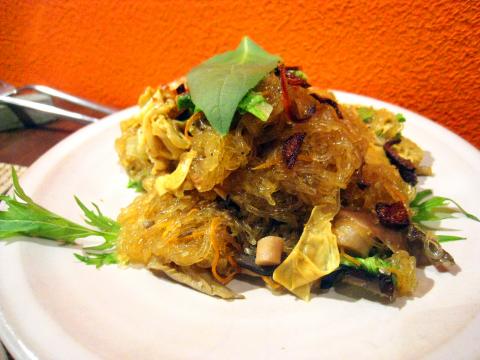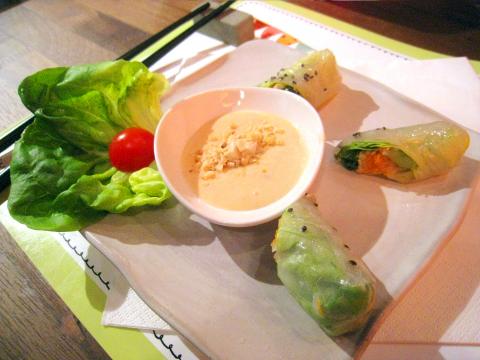While vegetarian food is not hard to find in Taipei, it certainly suffers from a lack of variety. This is, admittedly, the observation of a confirmed carnivore, whose periodic ventures into the world of vegetarian cuisine have usually left me uninspired.
The newly opened Chamkar, which serves Cambodian-inspired vegetarian food prepared by French owner Nicolas Devaux, is therefore a welcome addition to the fold.
Chamkar sports a clean, simple design that mixes exposed concrete with wood furnishings and a restrained use of Cambodian ornamentation. The overall effect is contemporary without being cold, and the widely spaced tables make for a very comfortable dining environment. The glass frontage looks over a small garden, softening the overall effect further.

Photo: Ian Bartholomew, Taipei TImes
An absence of Buddhist chanting, religious knickknacks, or servers in ostentatiously homespun robes,boded well.
The restaurant offers a lunch set menu (NT$270), two dinner set menus (NT$340 and NT$390), a children’s set menu (NT$190) and an a la carte selection. The lunch set, from which I ordered, offered a choice of two appetizers, six mains and three desserts, and a beverage. The selection looked very appealing on the page, and on the whole, the dishes I tried did not disappoint.
The winter salad of green leaves, sunflower seeds and wolfberries (枸杞) tossed with a mustard dressing suffered from a lack of variety in the leaves, dominated by the ubiquitous iceburg lettuce, but the dressing was bold without being overwhelming and the wolfberries provided a vibrant burst of flavor. It was a contrast to the other appetizer, a grilled papaya and vegetable soup. This was a light, clear soup subtlety infused with cinnamon, and while it did not blow me away, its flavors were nicely balanced.

Photo: Ian Bartholomew, Taipei TIme
A dish of pumpkin and pineapple with curry paste, coconut milk, toasted peanuts and fresh herbs was a highlight, packed with creamy, rich flavors. It was served with nicely cooked brown rice. The fresh herbs that Devaux uses really shine through.
The set was letdown by a dish of stir-fried glass noodles with curry paste, tofu skin and vegetables, which strived for elegance but didn’t quite achieve it and was visually less appealing.
Not having eaten Cambodian food before, I at least had the feeling that I was trying something different (rather than Thai or Vietnamese food under a different label). Chamkar is an offshoot of a restaurant that Devaux already runs in Cambodia, and he explained that Cambodian food is more closely related to Thai than Vietnamese, though more sweet and less spicy.
The children’s set menu was well thought out. The fresh spring rolls with a sweet peanut and chili sauce looked very attractive, immediately attracting the attention of the four-year-old I had brought along, and the Italian pasta with vegetable Bolognese sauce provided something familiar for children without compromising the restaurant’s commitment to the use of fresh herbs. All dishes can be prepared without garlic.
Chamkar offered a chocolate and a banana cake for dessert the day I visited. Both were tasty, though more home-cooking than restaurant food in their presentation.
Taken as a whole, the food was better, and more thoughtfully prepared and presented, than many other establishments offering a three-course set at a similar price point. Most notably, the flavors were clean and strong without resorting to heavy seasoning, a feat that must be applauded. While the absence of meat was disappointing (I thought the pumpkin dish would be really splendid with a red beef curry), I left Chamkar with the feeling of having enjoyed a satisfying gastronomic experience.

Cheng Ching-hsiang (鄭青祥) turned a small triangle of concrete jammed between two old shops into a cool little bar called 9dimension. In front of the shop, a steampunk-like structure was welded by himself to serve as a booth where he prepares cocktails. “Yancheng used to be just old people,” he says, “but now young people are coming and creating the New Yancheng.” Around the corner, Yu Hsiu-jao (饒毓琇), opened Tiny Cafe. True to its name, it is the size of a cupboard and serves cold-brewed coffee. “Small shops are so special and have personality,” she says, “people come to Yancheng to find such treasures.” She

Late last month Philippines Foreign Affairs Secretary Theresa Lazaro told the Philippine Senate that the nation has sufficient funds to evacuate the nearly 170,000 Filipino residents in Taiwan, 84 percent of whom are migrant workers, in the event of war. Agencies have been exploring evacuation scenarios since early this year, she said. She also observed that since the Philippines has only limited ships, the government is consulting security agencies for alternatives. Filipinos are a distant third in overall migrant worker population. Indonesia has over 248,000 workers, followed by roughly 240,000 Vietnamese. It should be noted that there are another 170,000

Hannah Liao (廖宸萱) recalls the harassment she experienced on dating apps, an experience that left her frightened and disgusted. “I’ve tried some voice-based dating apps,” the 30-year-old says. “Right away, some guys would say things like, ‘Wanna talk dirty?’ or ‘Wanna suck my d**k?’” she says. Liao’s story is not unique. Ministry of Health and Welfare statistics show a more than 50 percent rise in sexual assault cases related to online encounters over the past five years. In 2023 alone, women comprised 7,698 of the 9,413 reported victims. Faced with a dating landscape that can feel more predatory than promising, many in

Former Chinese Nationalist Party (KMT) chairwoman Hung Hsiu-chu’s (洪秀柱) attendance at the Chinese Communist Party’s (CPP) “Chinese People’s War of Resistance Against Japanese Aggression and the World Anti-Fascist War” parade in Beijing is infuriating, embarrassing and insulting to nearly everyone in Taiwan, and Taiwan’s friends and allies. She is also ripping off bandages and pouring salt into old wounds. In the process she managed to tie both the KMT and the Democratic Progressive Party (DPP) into uncomfortable knots. The KMT continues to honor their heroic fighters, who defended China against the invading Japanese Empire, which inflicted unimaginable horrors on the